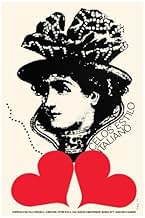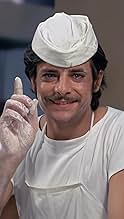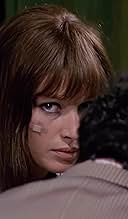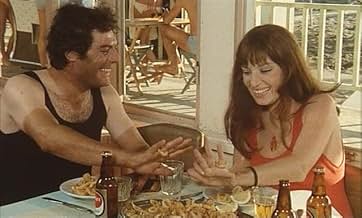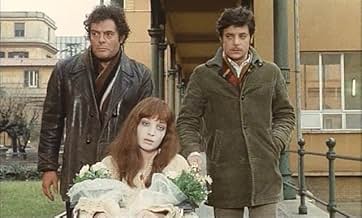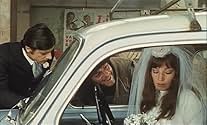IMDb रेटिंग
7.1/10
2.6 हज़ार
आपकी रेटिंग
अपनी भाषा में प्लॉट जोड़ेंA three-way love affair in the Rome of the early seventies.A three-way love affair in the Rome of the early seventies.A three-way love affair in the Rome of the early seventies.
- पुरस्कार
- 3 जीत और कुल 5 नामांकन
Manuel Zarzo
- Ugo
- (as Manolo Zarzo)
Hércules Cortés
- Ambleto di Meo
- (as Hercules Cortes)
Fernando Sánchez Polack
- District Head of Communist Party
- (as Fernando Sanchez Polak)
Angelo Casadei
- Street Spectator
- (बिना क्रेडिट के)
Nestore Cavaricci
- Waiting man in hospital
- (बिना क्रेडिट के)
फ़ीचर्ड समीक्षाएं
The fact that Paul Frees seems to do all the men's voices except for Marcello Mastroianni's and Giancarlo Giannini's seems to add a certain sameness to all the other men in the dubbed version of this film. Mastroianni is a communist bricklayer in love with Monica Vitti and she with him. He's best friends with Giannini, a Communist pizza maker, who's in love with Monica Vitti and she with him. It's like a dirty joke about them commies, they share everything. Except being human, they can't. It drives everyone crazy and the movie is very funny.
There seems to be enormous amounts of real subtextual commentary lost in translation. Mastroianni has his middle left finger in a sling throughout the movie, and is occasionally found on trash heaps. Given that his character's name is "Oreste" I think there's a reference to the classical legend, but it's not the Homeric, Pindaric, Sophoclean versions, but the bogus Robert Graves Year-King, fighting over Monica Vitti. Mastroianni does have flies buzzing around him a lot, indicating he's the Old King.
Given three screenwriters, including Age and Scarpelli, and Ettore Scola directing (he had given Vitti her first screen role almost two decades earlier), there is obviously a lot in this movie that is both precisely of its time and of its place, ill suited to the sort of random translation that an Italian sex comedy got in the 1970s. Unless someone is willing to go back and do a more careful translation, there's little more than a funny and bizarre comedy here. However it certainly is that.
There seems to be enormous amounts of real subtextual commentary lost in translation. Mastroianni has his middle left finger in a sling throughout the movie, and is occasionally found on trash heaps. Given that his character's name is "Oreste" I think there's a reference to the classical legend, but it's not the Homeric, Pindaric, Sophoclean versions, but the bogus Robert Graves Year-King, fighting over Monica Vitti. Mastroianni does have flies buzzing around him a lot, indicating he's the Old King.
Given three screenwriters, including Age and Scarpelli, and Ettore Scola directing (he had given Vitti her first screen role almost two decades earlier), there is obviously a lot in this movie that is both precisely of its time and of its place, ill suited to the sort of random translation that an Italian sex comedy got in the 1970s. Unless someone is willing to go back and do a more careful translation, there's little more than a funny and bizarre comedy here. However it certainly is that.
This is the passionate, tragic, acid, perversely funny story of a love triangle -- at one point, almost a ménage-à-trois -- involving bricklayer Oreste (Mastroianni in one of his very best performances, a sort of grotesque version of his character in "I Compagni"), flower-seller Adelaide (isn't it time we acknowledged Monica Vitti as THE most accomplished Italian comedienne ever? And being that gorgeous didn't hurt either) and pizzaiolo Nello (Giancarlo Giannini in a star-making role). With this film, Ettore Scola proved to be the great new voice in commedia all'italiana, a deserving heir to the maestri of this great tradition (DeSica, early Fellini, Germi, Monicelli, Risi) but adding steamier sarcasm and corrosiveness in his pitiless criticism of Italian society and its conservative mores.
We, as the audience, play a very important part here: it's to us (the invisible judge of a trial) that Oreste, Adelaide and Nello present their cases in the flashbacks that shows us the different angles of their convoluted story of friendship, love, betrayal and attempted murders/ suicides, in a sort of comedic Rashomon. The expertise of Scola's writing and the charisma of the starring trio make us care a lot for those hopeless losers, so unmistakably human.
Scola achieves a very rare thing: he uses caricature, comedic clichés and grotesqueness and raises them to refined art, craftily mixing tragedy and comedy with political overtones and social satire. This is on the same level as (and is a sort of cross between) Scola's masterpieces "C'Eravamo Tanto Amati" and "Brutti Sporchi Cattivi". You can do no wrong here: this is a delight that keeps your brain working AND your laughing muscles contracting, an achievement that sounds almost paradoxical by today's moronic, puerile standards of film comedy.
We, as the audience, play a very important part here: it's to us (the invisible judge of a trial) that Oreste, Adelaide and Nello present their cases in the flashbacks that shows us the different angles of their convoluted story of friendship, love, betrayal and attempted murders/ suicides, in a sort of comedic Rashomon. The expertise of Scola's writing and the charisma of the starring trio make us care a lot for those hopeless losers, so unmistakably human.
Scola achieves a very rare thing: he uses caricature, comedic clichés and grotesqueness and raises them to refined art, craftily mixing tragedy and comedy with political overtones and social satire. This is on the same level as (and is a sort of cross between) Scola's masterpieces "C'Eravamo Tanto Amati" and "Brutti Sporchi Cattivi". You can do no wrong here: this is a delight that keeps your brain working AND your laughing muscles contracting, an achievement that sounds almost paradoxical by today's moronic, puerile standards of film comedy.
Awesome movie.
I had never before watched an italian comedy but this one impressed me very much. The way that Ettore Scola deals with the tragic themes of the film is absolutely remarkable. By a use of the brechtian detachment he at first makes you laugh at horrible things such as suicide and conjugal violence while at the same time reminding you that what you are seeing is a film by constantly breaking the fourth wall and then at the end of the movie he makes the audience feel absolutely uncomfortable and guilty for indulging themselves in the humor of the film as he points out that these are not laughing matters and actual things that happen.
I also love the not monogamous undertone this one has and i can't help but thinking that the director implies that monogamy is outdated and one of the sources of violence against women. One thing that in a way validates this argument is the fact that Ettore Scola casts Monica Vitti in this, the same Monica Vitti famous for L'avventura and La notte, both films that deal with some of the same issues and always with the thought that maybe we would be better off if we renewed our morals (that by the way was sort of a obsession of Antonioni at the time, just watch his interviews).
Anyway it's a film and you can interpret it in whichever way you like to, i'm just here to say that it is a great, funny, beautifully shot, amazingly acted ( i absolutely love Monica Vitti in this), and amazingly scored and for those reasons, even if the politics in this don't interest you, you should see it regardless.
When l watched this movie in early 1984 I' wasn't able and ready to understand how complicate is an Italian comedy at all, they talk louder, so many facial expressions, body language, whatever they are different, so that time l'd gave a low grade 4/10, now on first revisiting on DVD l've increase a little to 7.5/10, still is very low underrated by IMDb's users, well l've to confess that the movie didn't make my head, maybe a dated movie, Ettore Scola was a fine director like in Brutti, Sporchi e Cattive that is really good movie, even often of dubious taste humor!!!
Thanks for reading
Resume:
First watch: 1984 / How many: 3 / Source: TV-DVD / Rating: 7.5.
Thanks for reading
Resume:
First watch: 1984 / How many: 3 / Source: TV-DVD / Rating: 7.5.
The Pizza Triangle is a cute enough Italian romantic comedy with some really outlandish touches around the center and a nicely scuzzy character played by the normally smooth Marcello Mastriani. These last two things would probably be trimmed tho (including its ending) would it have been a bigger hit in Italy and then remade for America so maybe its good it wasn't remade...but then again most people would have also heard of this and it'd be much more widely available to watch today as well so maybe that's not a good thing then.
Monica Vitti wildly overplays the fun loving/fast living woman at the center of the love triangle. She spots Marcello Mastriani not as the handsome man you normally see but as a drunk guy passed out on the street and instantly falls in love with him (i know but its a movie!) each one is sure they've seen each other before in a shop and were attracted to each other then so when she spots him laying in that gutter he's certainly pleased to wake up and see her standing over him. Unfortunately for her--he ends up being a wildly jealous boar who is prone to fits of both the drinking and temper kind and is soon turning her attentions to the swooning pizza maker in the little eatery that Mastriani keeps taking her to. The pizza maker played by a rather youngish Giancarlo Gianni woos her right under Marcello's nose with a slice of pizza in the shape of a heart---its a very cute scene when Vitti gets the heart shaped slice of pizza looks up and sees Gianni staring at her--its one of those meet cute scenes that would totally be at home in a big Hollywood romance (which is why i'm surprised this wasn't redone quite honestly) and while Vitti and her pizza maker start cuddling up Marcello starts questioning himself and his ability to hold a relationship and generally being a mope--except for when he's throwing one of his fits. Eventually he and the pizza chef (who already knew each other cause well Marcello eats his food) decide to try and share Monica Vitti--and as anyone who's ever seen Vitti in her prime can attest--half a Vitti is better then no Vitti at all.
The attempts at Jules and Jilm like comedy don't really mesh with the kind of angry, self righteous character that had been Mastriani's character up to that point, and you can pretty much guess where the film goes once the 2 guys decide to try and share Vitti. The movie doesn't quite live up to the first 5 or 10 minutes as a whole. When you see that sequence of Vitti at the fair and spotting Mastriani and then Mastriani seeing her--you think OK this is going to be very well filmed and is going to be passionate as all get out. It doesn't really pan out that way and not because of Mastriani's rather bitter character--its more because the film's attempts at humor are just too over the top to take seriously---Mastriani and Vitti share a fly together (mastriani's character is so filthy at the beginning that he keeps doing battle with the same fly--who Vitti then calls "our fly" and indeed whenever she starts to feel Mastriani's presence--you hear the fly buzzing on the soundtrack and sometimes see it actually flying around the screen as well--its a neat touch but one that's also irritating the more times it happens) Vitti's character herself is so over the top and so fickle--i personally stopped caring about which of the 2 suitors she's going to end up with long before she actually makes a decision (and then promptly changes her mind a couple more times for good measure) The film was enjoyable enough--its certainly pretty to look at for the most part--but the character's behavior and the fact that everything is done in these big broad strokes makes the rest of the film not as good as it could've been....the way Vitti carries on i would've thought that this was a role that Sophia Loren had turned down quite honestly--it wouldn't be hard to see why Loren would of turned this one down--the character that Vitti's playing is nowhere near the head strong, self sufficient larger then life characters that Loren had come to fame playing, and that's part of the main problem of the movie itself.
Monica Vitti wildly overplays the fun loving/fast living woman at the center of the love triangle. She spots Marcello Mastriani not as the handsome man you normally see but as a drunk guy passed out on the street and instantly falls in love with him (i know but its a movie!) each one is sure they've seen each other before in a shop and were attracted to each other then so when she spots him laying in that gutter he's certainly pleased to wake up and see her standing over him. Unfortunately for her--he ends up being a wildly jealous boar who is prone to fits of both the drinking and temper kind and is soon turning her attentions to the swooning pizza maker in the little eatery that Mastriani keeps taking her to. The pizza maker played by a rather youngish Giancarlo Gianni woos her right under Marcello's nose with a slice of pizza in the shape of a heart---its a very cute scene when Vitti gets the heart shaped slice of pizza looks up and sees Gianni staring at her--its one of those meet cute scenes that would totally be at home in a big Hollywood romance (which is why i'm surprised this wasn't redone quite honestly) and while Vitti and her pizza maker start cuddling up Marcello starts questioning himself and his ability to hold a relationship and generally being a mope--except for when he's throwing one of his fits. Eventually he and the pizza chef (who already knew each other cause well Marcello eats his food) decide to try and share Monica Vitti--and as anyone who's ever seen Vitti in her prime can attest--half a Vitti is better then no Vitti at all.
The attempts at Jules and Jilm like comedy don't really mesh with the kind of angry, self righteous character that had been Mastriani's character up to that point, and you can pretty much guess where the film goes once the 2 guys decide to try and share Vitti. The movie doesn't quite live up to the first 5 or 10 minutes as a whole. When you see that sequence of Vitti at the fair and spotting Mastriani and then Mastriani seeing her--you think OK this is going to be very well filmed and is going to be passionate as all get out. It doesn't really pan out that way and not because of Mastriani's rather bitter character--its more because the film's attempts at humor are just too over the top to take seriously---Mastriani and Vitti share a fly together (mastriani's character is so filthy at the beginning that he keeps doing battle with the same fly--who Vitti then calls "our fly" and indeed whenever she starts to feel Mastriani's presence--you hear the fly buzzing on the soundtrack and sometimes see it actually flying around the screen as well--its a neat touch but one that's also irritating the more times it happens) Vitti's character herself is so over the top and so fickle--i personally stopped caring about which of the 2 suitors she's going to end up with long before she actually makes a decision (and then promptly changes her mind a couple more times for good measure) The film was enjoyable enough--its certainly pretty to look at for the most part--but the character's behavior and the fact that everything is done in these big broad strokes makes the rest of the film not as good as it could've been....the way Vitti carries on i would've thought that this was a role that Sophia Loren had turned down quite honestly--it wouldn't be hard to see why Loren would of turned this one down--the character that Vitti's playing is nowhere near the head strong, self sufficient larger then life characters that Loren had come to fame playing, and that's part of the main problem of the movie itself.
क्या आपको पता है
- ट्रिवियाThis was the first of eight starring feature film roles Marcello Mastroianni would appear in for Ettore Scola. These films included Una giornata particolare (1977), La terrazza (1980), La nuit de Varennes (1982), Permette? Rocco Papaleo (1971), Splendor (1989), Che ora è (1989), and Maccheroni (1985).
- भाव
Oreste: How would you like a pizza? Huh?
Adelaide: You mean pizza?
Oreste: Yes! Pizza.
Adelaide: But, I'm not in the mood for pizza.
Oreste: Oh, but your favorite meal is pizza. Come on!
Adelaide: But, I don't feel like eating pizza today.
Oreste: You can't talk me out of it. We're definitely eating pizza.
- कनेक्शनEdited into Dolce Vitti (2014)
टॉप पसंद
रेटिंग देने के लिए साइन-इन करें और वैयक्तिकृत सुझावों के लिए वॉचलिस्ट करें
- How long is The Pizza Triangle?Alexa द्वारा संचालित
विवरण
- चलने की अवधि1 घंटा 47 मिनट
- ध्वनि मिश्रण
- पक्ष अनुपात
- 1.85 : 1
इस पेज में योगदान दें
किसी बदलाव का सुझाव दें या अनुपलब्ध कॉन्टेंट जोड़ें

टॉप गैप
By what name was Dramma della gelosia (tutti i particolari in cronaca) (1970) officially released in Canada in English?
जवाब
